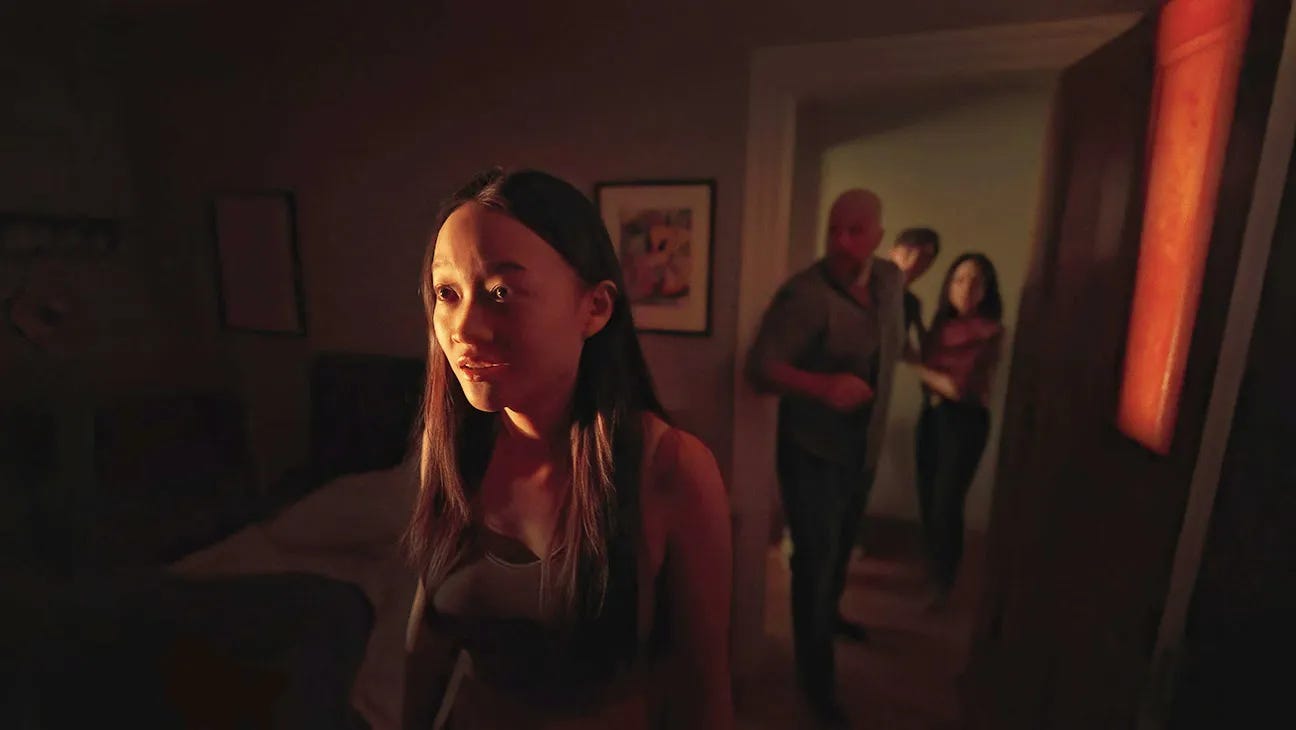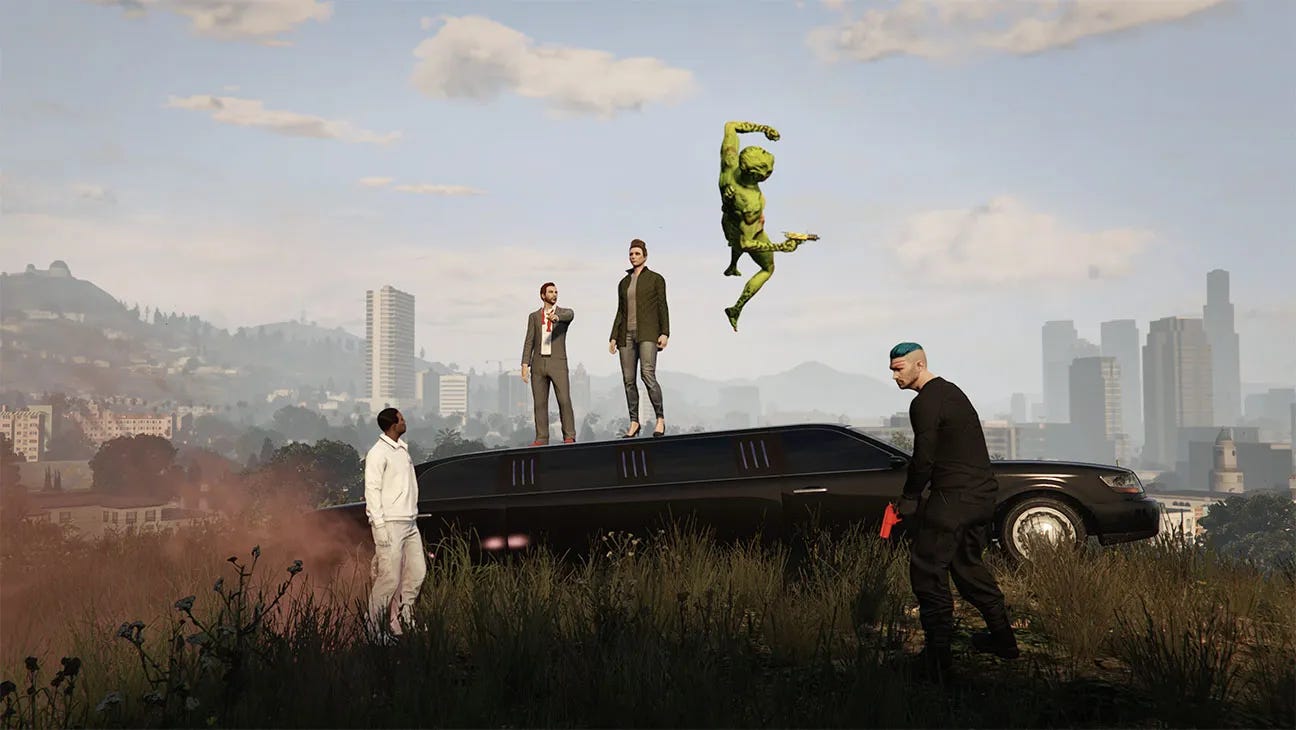In Review: 'Presence,' 'Grand Theft Hamlet'
Steven Soderbergh gets spooky and experimental while a new documentary chronicles an unusual staging of Shakespeare.
Presence
Dir. Steven Soderbergh
85 min.
There are some directors who fussily curate their careers, taking enough time between projects, like Stanley Kubrick or Paul Thomas Anderson, to the point where every film feels like an event.Others even setting limits on how many they can make, like Quentin Tarantino’s odd plan to retire after exactly ten features. That is not Steven Soderbergh. Ever since he took over as his own cameraman and embraced the nimbler possibilities of digital productions, Soderbergh has given himself the freedom to fuck around—with TV series like The Knick; with video experiments like Full Frontal, Bubble, and High Flying Bird; and with minor projects funded by patrons at Netflix and HBO. He’s incapable of making an uninteresting film—though The Laundromat was pushing it—but a few could stand a little more time in the incubator.
The visual conceit for Presence, his second attempt at horror deconstruction after 2018’s Unsane, is plainly its raison d’être: What if an entire horror film could be made from the perspective of a ghost? And not about a specter, either, like A Ghost Story, but from a first-person camera floating around a house. It doesn’t seem to be Soderbergh’s intention to make Presence a conventionally scary film—he has failed too hard for that to be the case—though objects do occasionally drift through the air and a few books are stacked conspicuously. But the experiment allows Soderbergh to move the camera in odd little flight patterns and make it a character of sorts, a mysterious force with a human-like curiosity and a hidden agenda. It’s the film’s most compelling character in a walk.
The task of making the flesh-and-bone characters equally compelling falls to the veteran screenwriter David Koepp, whose blockbuster credits include Jurassic Park and Sam Raimi’s first Spider-Man, and who penned Soderbergh’s terrific COVID-era thriller Kimi a few years ago. His script here feels a few rewrites short of the mark, but he has the smart idea of bringing a family into a haunted house that’s already roiling with internal turmoil. The family snaps the cute two-story house up before it hits the market, mainly because Rebecca (Lucy Liu), the alpha-mother who runs the show, wants her beloved son Tyler (Eddy Maday) to join the optimal high-school swimming team. She cares less about her daughter Chloe (Callina Lang), who’s grieving from a loss-to-be-named later, so Chloe’s emotional well-being falls to her husband Chris (Chris Sullivan) to manage. The siblings and the parents are constantly sniping at each other, which keeps them from facing the ghost as a unified front.
Soderbergh treats the ghost’s small interventions with typical deftness and humor, as well as a certain stylistic brio, courtesy of his nom-de-camera Peter Andrews, who deploys wide-angle distortions and woozy movements to imitate the spirit. The ghost POV also gives the drama an elliptical quality that’s subtly effective, because we’re only listening into a select number of conversations and moments, rather than following a conventional dramatic pattern. Yet Koepp’s script eventually boils down to a clunky subplot involving Tyler’s sensitive jock buddy Ryan (West Mulholland), whose romantic interest in Chloe leads to a wholly unsurprising turn. Maybe Soderbergh and Koepp could have given themselves more time to make a few tweaks in order for the film to stick the landing. But there’s a pervasive sense that Soderbergh is already moving on to the next project. — Scott Tobias
Presence opens in theaters everywhere this weekend.
Grand Theft Hamlet
Dirs. Sam Crane and Pinny Grylls
89 min.
Among the first problems actors Sam Crane and Mark Oosterveen encounter when they decide to stage a new production of Hamlet is how to avoid getting murdered by passersby. Other problems: police raids, masked interlopers with unclear intentions, and unsteady surfaces that send actors plummeting to their deaths (until they can respawn, of course). All those problems stem from their production’s venue, Grand Theft Auto Online, the multiplayer version of the famously violent video game. But, this being 2021, the Covid lockdown has placed some pretty serious restrictions on where they can ply their trade. With stages shuttered, they attempt to find a safe spot for the Bard on the mean streets of Los Santos.
Filmed entirely within the game, Grand Theft Hamlet follows Crane, Oosterveen, and Crane’s filmmaker partner Pinny Grylls (who serves as the film’s co-director with Crane) as they plot their production while occasionally exchanging blows and gunfire with players who don’t know, or don’t care, what they’re up to. In the process, they discover that, for all its perils, GTA’s open world presents possibilities unimaginable in the real world. Why not hold auditions in Los Santos’ equivalent of the Hollywood Bowl? Why not, for that matter, stage scenes on the back of a blimp?
Grand Theft Hamlet finds amusing wrinkles at every stage of Crane and Oosterveen’s project, but it’s the human element that keeps the film compelling. At the height of lockdown, Grand Theft Auto Online provides constant reminders of the things they can’t do anymore, like walk amongst people or watch the sunset from a beach. For Oosterveen, who’s single and has no close family, the staging of Hamlet becomes less of a lark than a passion project. In one scene, Grylls and Crane discuss whether or not Crane is spending too much time in the game only to realize they can, and should, log off and talk about it in person.
What we see of the final production looks quite wooly—few versions of Hamlet feature aliens dancing lasciviously in the background of the climactic scene—but the relationships Crane, Oosterveen, and Grylls form with their motley crew of amateur and professional players* suggest that, sure, the play’s the thing but not the only thing. What’s more, stretches of Grand Theft Hamlet suggest the platform has untapped dramatic possibilities that go beyond the casual commitment of felonies. “Man delights not me,” Sam recites, shortly before getting punched by an NPC who calls him a “fucking idiot.” What is that, if not confirmation of Shakespeare’s immortality? —Keith Phipps
Grand Theft Hamlet is now in select theaters.
* Full disclosure: Grand Theft Hamlet’s cast includes Jen Cohn, a friend of this newsletter.









I was hopeful about Presence and am now a little less so, but I had no idea Grand Theft Hamlet existed and now it’s a must see. What a potentially great/potentially awful idea! I think I’ll stage King Lear in Elden Ring.
"His script here feels a few rewrites short of the mark"
I know you and Keith liked it better than I did, but this really describes Kimi as well. I don't understand why Soderbergh continues to work in this way, when just putting in a *little* more effort could make these movies much better.